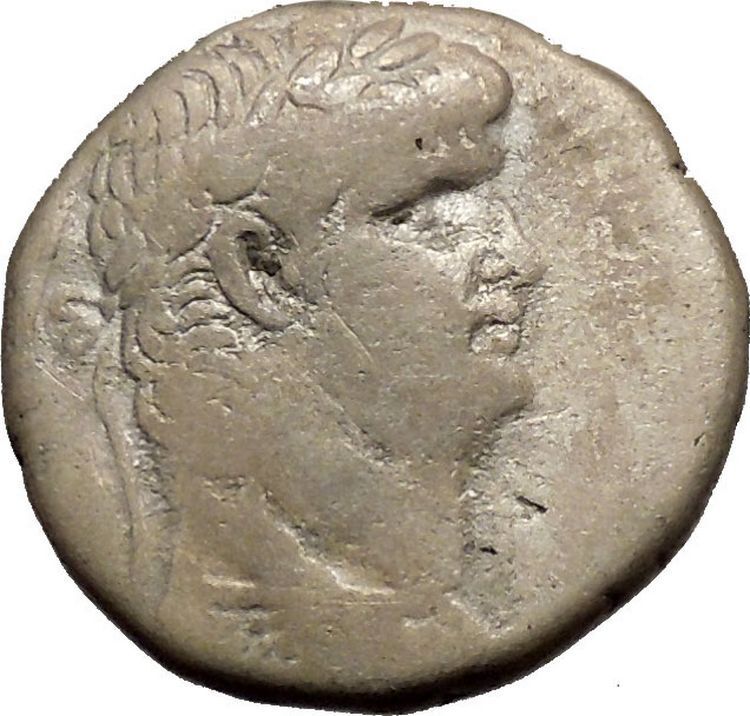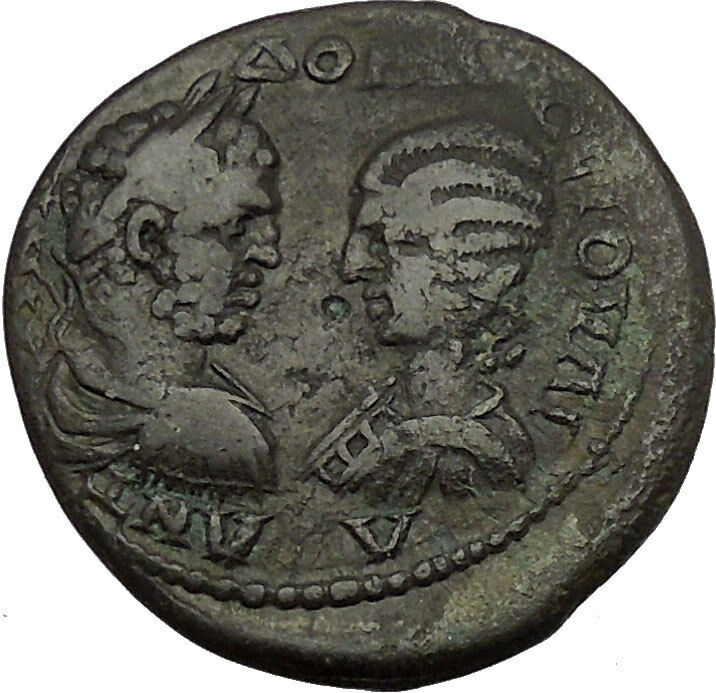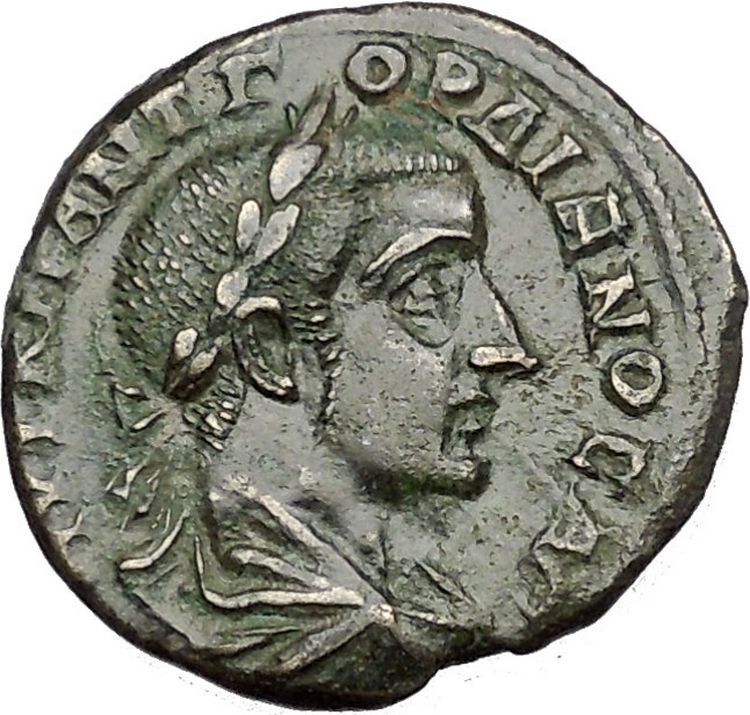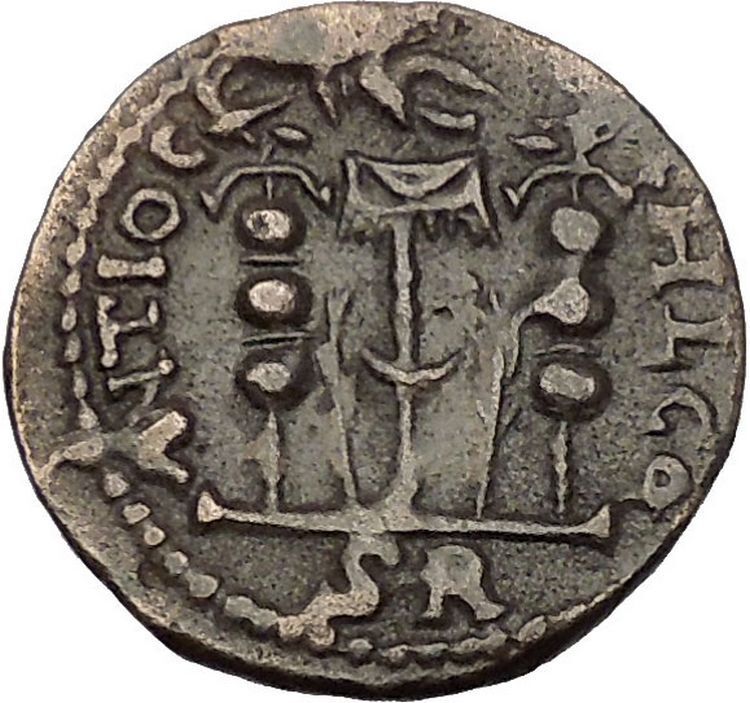|
Severus Alexander – Roman Emperor: 222-235 A.D.
Severus Alexander with Julia Maesa
Bronze Pentassarion 25mm (10.98 grams) of Marcianopolis in Moesia Inferior under Legate Tiberius Iulius Festus.
AVT K M AVP CEVH AΛEΞANΔPOC IOVΛIA MAICA, laureate draped and cuirassed bust of emperor right on left facing diademed draped bust of Julia Maesa facing left on right.
YΠ TIB IOVΛ ΦHCTOV MAPKIANOΠOΛITΩΝ, Tyche standing facing with her head left holding a rudder and cornucopia; E (mark of value) in field to right.
You are bidding on the exact item pictured, provided with a Certificate of Authenticity and Lifetime Guarantee of Authenticity.
 Tyche (meaning “luck”; Roman equivalent: Fortuna) was the presiding tutelary deity that governed the fortune and prosperity of a city, its destiny. She is the daughter of Aphrodite and Zeus or Hermes. Tyche (meaning “luck”; Roman equivalent: Fortuna) was the presiding tutelary deity that governed the fortune and prosperity of a city, its destiny. She is the daughter of Aphrodite and Zeus or Hermes.
In literature, she might be given various genealogies, as a daughter of Hermes and Aphrodite, or considered as one of the Oceanids, daughters of Oceanus and Tethys, or of Zeus. She was connected with Nemesis and Agathos Daimon (“good spirit”).
The Greek historian Polybius believed that when no cause can be discovered to events such as floods, droughts, frosts or even in politics, then the cause of these events may be fairly attributed to Tyche.
Worship
Increasingly during the Hellenistic period, cities venerated their own specific iconic version of Tyche, wearing a mural crown (a crown like the walls of the city).
Tyche had temples at Caesarea Maritima, Antioch, Alexandria and Constantinople. In Alexandria the Tychaeon, the temple of Tyche, was described by Libanius as one of the most magnificent of the entire Hellenistic world.
She was uniquely venerated at Itanos in Crete, as Tyche Protogeneia, linked with the Athenian Protogeneia (“firstborn”), daughter of Erechtheus, whose self-sacrifice saved the city.
Stylianos Spyridakis concisely expressed Tyche’s appeal in a Hellenistic world of arbitrary violence and unmeaning reverses: “In the turbulent years of the Epigoni of Alexander, an awareness of the instability of human affairs led people to believe that Tyche, the blind mistress of Fortune, governed mankind with an inconstancy which explained the vicissitudes of the time.”
Depictions
Tyche appears on many coins of the Hellenistic period in the three centuries before the Christian era, especially from cities in the Aegean. Unpredictable turns of fortune drive the complicated plotlines of Hellenistic romances, such as Leucippe and Clitophon or Daphnis and Chloe. She experienced a resurgence in another era of uneasy change, the final days of publicly sanctioned Paganism, between the late-fourth-century emperors Julian and Theodosius I who definitively closed the temples. The effectiveness of her capricious power even achieved respectability in philosophical circles during that generation, though among poets it was a commonplace to revile her for a fickle harlot.
In medieval art, she was depicted as carrying a cornucopia, an emblematic ship’s rudder, and the wheel of fortune, or she may stand on the wheel, presiding over the entire circle of fate.
The constellation of Virgo is sometimes identified as the heavenly figure of Tyche, as well as other goddesses such as Demeter and Astraea.
Marcianopolis, or Marcianople was an ancient Roman city in Thracia. It was located at the site of modern day Devnya, Bulgaria.
The city was so renamed by Emperor Trajan after his sister Ulpia Marciana, and was previously known as Parthenopolis. Romans repulsed a Gothic attack to this town in 267 (or 268), during the reign of Gallienus. Diocletian made it the capital of the Moesia Secunda province.
Valens made it his winter quarters in 368 and succeeding years, Emperor Justinian I restored and fortified it. In 587, it was sacked by the king of the Avars but at once retaken by the Romans. The Roman army quartered there in 596 before crossing the Danube to assault the Avars.
Between 893 and 972 it was one of the most important medieval cities in south-eastern Europe.
 Severus Alexander – Roman Emperor: 222-235 A.D. Severus Alexander – Roman Emperor: 222-235 A.D.
Caesar: 221-222 A.D. (under Elagabalus)
| Son of Julia Mamaea | Husband of Orbiana | Grandson of Julia Maesa | Nephew of Julia Soaemias | Cousin of Elagabalus | Second-cousin of Caracalla and Geta | Great-nephew of Septimius Severus and Julia Domna |
Severus Alexander (Latin: Marcus Aurelius Severus Alexander Augustus; 1 October 208 – 19 March 235) was Roman Emperor from 222 to 235 and the last emperor of the Severan dynasty. He succeeded his cousin Elagabalus, upon the latter’s assassination in 222, and was ultimately assassinated himself, marking the epoch event for the Crisis of the Third Century – nearly 50 years of civil wars, foreign invasion, and collapse of the monetary economy, though this last part is now disputed.
Alexander was the heir apparent to his cousin, the 18-year-old Emperor who had been murdered along with his mother Julia Soaemias, by his own guards, who, as a mark of contempt, had their remains cast into the Tiber river. He and his cousin were both grandsons of the influential and powerful Julia Maesa, who had arranged for Elagabalus’ acclamation as emperor by the famous Third Gallic Legion. It was the rumor of Alexander’s death that triggered the assassination of Elagabalus and his mother.
As emperor, Alexander’s peace time reign was prosperous. However, Rome was militarily confronted with the rising Sassanid Empire and growing incursions from the tribes of Germania. He managed to check the threat of the Sassanids. But when campaigning against Germanic tribes, Alexander attempted to bring peace by engaging in diplomacy and bribery. This alienated many in the Roman Army and led to a conspiracy to assassinate and replace him.
Domestic achievements
Under the influence of his mother, Alexander did much to improve the morals and condition of the people, and to enhance the dignity of the state. He employed noted jurists to oversee the administration of justice, such as the famous jurist Ulpian. His advisers were men like the senator and historian Cassius Dio, and it is claimed that he created a select board of 16 senators, although this claim is disputed. He also created a municipal council of 14 who assisted the urban prefect in administering the affairs of the 14 districts of Rome. Excessive luxury and extravagance at the imperial court were diminished, and he restored the Baths of Nero in 227 or 229; consequently, they are sometimes also known as the Baths of Alexander after him.
Upon his accession he reduced the silver purity of the denarius from 46.5% to 43% – the actual silver weight dropped from 1.41 grams to 1.30 grams; however, in 229 he revalued the denarius, increasing the silver purity and weight to 45% and 1.46 grams, respectively. The following year he decreased the amount of base metal in the denarius while adding more silver, raising the silver purity and weight again to 50.5% and 1.50 grams. Also during his reign taxes were lightened; literature, art and science were encouraged; and, for the convenience of the people, loan offices were instituted for lending money at a moderate rate of interest.
In religious matters, Alexander preserved an open mind. It is said that he was desirous of erecting a temple to Jesus but was dissuaded by the pagan priests. He allowed a synagogue to be built in Rome, and he gave as a gift to this synagogue a scroll of the Torah known as the Severus Scroll.
In legal matters, Alexander did much to aid the rights of his soldiers. He confirmed that soldiers could name anyone as heirs in their will, whereas civilians had strict restrictions over who could become heirs or receive a legacy. Alexander also confirmed that soldiers could free their slaves in their wills. Additionally, he protected the rights of soldiers to their property when they were off on campaign and reasserted that a soldier’s property acquired in or because of military service (his castrense peculium) could be claimed by no one else, not even the soldier’s father.
Persian War
On the whole, Alexander’s reign was prosperous until the rise, in the east, of the Sassanids under Ardashir I. Of the war that followed there are various accounts. According to Herodian, the Roman armies suffered a number of humiliating setbacks and defeats, while according to the Historia Augusta as well as Alexander’s own dispatch to the Roman Senate, he gained great victories. Making Antioch his base, he marched at the head of his troops towards Ctesiphon, but a second army was destroyed by the Persians, and further losses were incurred by the retreating Romans in Armenia.
Nevertheless, although the Sassanids were checked for the time, the conduct of the Roman army showed an extraordinary lack of discipline. In 232 there was a mutiny in the Syrian legion, who proclaimed Taurinus emperor. Alexander managed to suppress the uprising, and Taurinus drowned while attempting to flee across the Euphrates. The emperor returned to Rome and celebrated a triumph in 233.
Germanic War
After the Persian war, Alexander returned to Antioch with the famous Origen, one of the greatest Fathers of the Christian Church. Alexander’s mother, Julia Mammaea, asked for Origen to tutor Alexander in Christianity.
While Alexander was being educated in the Christian doctrines, the northern portion of his empire was being invaded by Germanic and Sarmatian tribes. A new and menacing enemy started to emerge directly after Alexander’s success in the Persian war. In A.D 234, the barbarians crossed the Rhine and Danube in hordes that even caused panic at the gates of Rome. The soldiers serving under Alexander, who were already demoralized after their costly war against the Persians, were further discontented with their emperor when their homes were destroyed by the barbarian invaders.
As word of the invasion spread, the Emperor took the front line and went to battle against the Germanic invaders. The Romans prepared heavily for the war, building a brigade of ships to carry the entire battalion across. However, at this point in Alexander’s career, he still knew little about being a general. Because of this, he hoped the sole threat of his armies might be enough to persuade the Germanics to surrender. Severus enforced a strict military discipline in his men that sparked a rebellion among the Germanic legions. Due to incurring heavy losses against the Persians, and on the advice of his mother, Alexander attempted to buy the Germanic tribes off, so as to gain time.
It was this decision that resulted in the legionaries’ looking down upon Alexander. They considered him dishonorable and feared he was unfit to be Emperor. Under these circumstances the army swiftly looked to replace Alexander.
Gaius Iulius Verus Maximinus was the next best option. He was a soldier from Thrace who had a golden reputation and was working hard to increase his military status. He was also a man with superior personal strength, who rose from peasantry to ultimately being the one chosen for the throne. With the Thracian’s hailing came the end of the Severan Dynasty. With Severus’ own army growing with animosity and turning against him, the path for his assassination was paved.
Death
Alexander was forced to face his German enemies in the early months of 235. By the time he and his mother arrived, the situation had settled, and so his mother convinced him that to avoid violence, trying to bribe the German army to surrender was the more sensible course of action. According to historians, it was this tactic combined with insubordination from his own men that destroyed his reputation and popularity. Pusillanimity was responsible for the revolt of Alexander’s army, resulting in Severus’ falling victim to the swords of his own men, following the nomination of Maximinus as emperor.
Alexander was assassinated March 19, 235 together with his mother, in a mutiny of the Legio XXII Primigenia at Moguntiacum (Mainz) while at a meeting with his generals. These assassinations secured the throne for Maximinus.
Lampridius documents two theories that elaborate on the Severus’ assassination. The first claims that the disaffection of Mammaea was the main motive behind the homicide. However, Lampridius makes it clear that he is more supportive of an alternative theory, that Alexander was murdered in Sicilia (located in Britain).
This theory has it that, in an open tent after his lunch, Alexander was consulting with his insubordinate troops, who compared him to his cousin Elagabalus, the divisive and unpopular Emperor whose own assassination paved the way for Alexander’s reign. A German servant entered the tent and initiated the call for Alexander’s assassination, at which point many of the troops joined in the attack. Alexander’s attendants fought against the other troops but could not hold off the combined might of those seeking the Emperor’s assassination. Within minutes, Alexander was dead.
After Alexander’s death his economic policies were completely discarded, and the Roman currency was devalued. This marked the beginning of the Crisis of the Third Century, a time period in which the Roman empire came close to falling apart entirely.
|





 Tyche (meaning “luck”; Roman equivalent: Fortuna) was the presiding tutelary deity that governed the fortune and prosperity of a city, its destiny. She is the daughter of Aphrodite and Zeus or Hermes.
Tyche (meaning “luck”; Roman equivalent: Fortuna) was the presiding tutelary deity that governed the fortune and prosperity of a city, its destiny. She is the daughter of Aphrodite and Zeus or Hermes. Severus Alexander – Roman Emperor: 222-235 A.D.
Severus Alexander – Roman Emperor: 222-235 A.D. 




